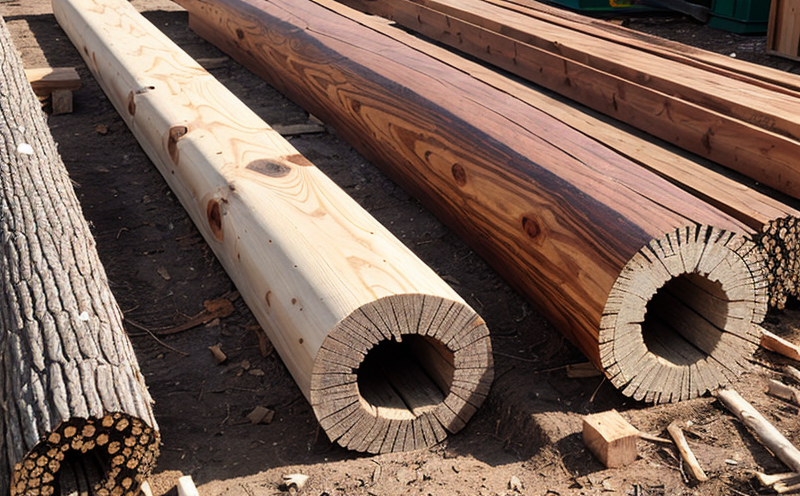Preservative Performance Testing under Tropical Conditions
The testing of wood preservatives in tropical conditions is a critical aspect of ensuring the longevity and durability of wooden structures used in agriculture, forestry, and infrastructure projects. The unique environmental factors such as high humidity, intense sunlight, and elevated temperatures found in tropical regions can significantly affect preservative performance. This service ensures that the selected preservatives effectively protect wood from biological decay and mechanical degradation.
The testing protocol involves several steps: specimen preparation, immersion in preservatives, exposure to specific environmental conditions mimicking actual use scenarios, and subsequent evaluation of the treated samples' integrity. The specimens are subjected to controlled tropical conditions, including high humidity levels and direct sunlight, over extended periods to assess their resistance to decay.
Testing under these conditions is crucial because it provides a realistic assessment of how wood preservatives will perform in real-world applications. It helps manufacturers and users identify the most effective preservatives for specific projects, ensuring that wooden structures remain sound and functional throughout their expected lifespan.
The testing process typically involves the following steps:
- Selection of appropriate wood specimens
- Immersion of specimens in various preservative solutions
- Exposure to controlled tropical conditions for extended periods
- Evaluation of the treated specimens' resistance to decay and mechanical properties
The results from these tests are essential for ensuring compliance with international standards such as ISO 6389:2017, which provides guidance on the testing methods for wood preservatives. Understanding the performance under tropical conditions helps in making informed decisions about material selection, project design, and maintenance schedules.
Industry Applications
| Application Area | Description of Application |
|---|---|
| Agricultural Structures | The durability of wooden agricultural structures such as barns, silos, and fences can be significantly extended by using effective wood preservatives. This testing ensures that the materials used are suitable for long-term exposure to tropical environments. |
| Forestry Products | Testing helps in selecting the best preservatives for the production of forestry products like logs, poles, and posts which will be exposed to harsh tropical conditions during use. |
| Infrastructure Projects | The integrity of wooden components used in infrastructure projects such as bridges, docks, and piers is crucial. This testing ensures that these structures remain robust against decay, ensuring safety and longevity. |
The results from this testing are vital for various industries where wood is exposed to tropical environments. It enables the selection of suitable preservatives based on performance data specific to tropical conditions. This information is critical for quality managers, compliance officers, R&D engineers, and procurement specialists in ensuring that the materials used meet the required standards.
Eurolab Advantages
At Eurolab, we offer unparalleled expertise in wood durability testing under tropical conditions. Our state-of-the-art facilities are equipped with sophisticated instrumentation and a team of experienced professionals who understand the unique challenges faced by wooden structures in tropical environments.
- Accurate Replication of Tropical Conditions: Our controlled environmental chambers can simulate high humidity, intense sunlight, and elevated temperatures found in tropical regions. This allows for accurate replication of real-world conditions under which the wood will be used.
- Comprehensive Testing Capabilities: We use a range of testing methods to assess various aspects of preservative performance, including resistance to decay, mechanical properties, and color retention.
- International Standards Compliance: Our tests are conducted in accordance with international standards such as ISO 6389:2017, ensuring that the results are reliable and internationally recognized.
The combination of our advanced facilities and experienced team ensures that we deliver accurate, reliable, and relevant test results. This enables clients to make informed decisions about material selection and project design, ultimately leading to more robust and long-lasting wooden structures.
Environmental and Sustainability Contributions
- Sustainable Materials Use: By ensuring that preservatives are effective under tropical conditions, we help prevent the premature degradation of wood. This extends the lifespan of wooden structures, reducing the need for frequent replacements and minimizing waste.
- Energy Efficiency: Longer-lasting wood structures require less maintenance, leading to reduced energy consumption associated with frequent repairs and replacements.
- Biodiversity Preservation: By extending the life of wooden structures, we contribute to the preservation of natural resources by reducing the demand for new timber and minimizing deforestation.
The testing services provided by Eurolab not only ensure compliance with international standards but also contribute positively to environmental sustainability. Our efforts help in promoting a more sustainable use of wood as a renewable resource, ensuring that wooden structures remain robust and functional while minimizing their ecological footprint.





